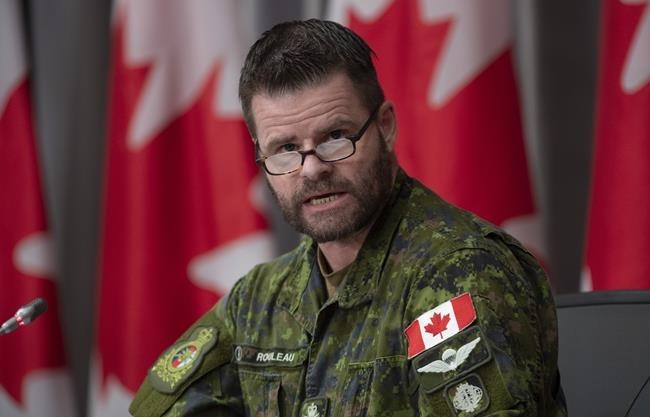OTTAWA — The commander of the Canadian Armed Forces is preparing to formally apologize to victims of sexual misconduct as the military seeks to turn the page on its record of failing to prevent inappropriate and criminal behaviour.
The Armed Forces and Department of National Defence quietly floated the idea of an apology last year as the federal government reached a $900-million settlement deal on several class-action lawsuits brought by former and current service members.
The apology was not required as part of that settlement agreement, said lawyer Jonathan Ptak, who represented some of the plaintiffs in the six overlapping lawsuits that included both military personnel and civilian Defence Department employees.
“It was voluntarily offered by Canada,” Ptak said Monday.
“To mandate an apology is different from an apology which is given outside the context of the contract. So I actually think it's meaningful in a different way.”
Exactly when the apology will be delivered and whether it will be in person or online remains uncertain, however, as the COVID-19 pandemic continues to wreak havoc across Canada.
“The apology is an important part of restoring relationships with those harmed by sexual misconduct,” Defence Department spokeswoman Jessica Lamirande told The Canadian Press in an email.
“As the COVID-19 pandemic has impacted its planning, details and timing of the apology will be shared following further discussion and consultation.”
The apology will be delivered by both the chief of defence staff and the deputy minister of the Department of National Defence, it’s not clear who will actually be the defence chief when the time comes.
Gen. Jonathan Vance has personally championed the fight against sexual misconduct in the ranks since he took over as chief of the defence staff in 2015. He soon launched an all-out effort to eradicate such behaviour.
In July, Vance announced his plan to retire. The government has yet to name a successor.
Defence Minister Harjit Sajjan on Monday did not give any update on the search for a new defence chief or the pending apology.
"Rest assured, we are not going to stop until we get the appropriate culture change inside the Canadian Armed Forces that allows everyone, especially women, to be able to succeed in an environment that is safe and reaches their highest potential," he said in Ottawa.
Deputy chief of the defence staff Lt.-Gen. Mike Rouleau recently told The Canadian Press that the apology is “the right thing to do,” and that it is being planned alongside a training week for military members on sexual misconduct.
Marie-Claude Gagnon, a former naval reservist who founded a group for survivors of military sexual trauma called It's Just 700, said the apology could represent a bookend to Vance’s tenure as defence chief, given how he started in the position.
On the other hand, having his successor begin his or her own time as Canada’s top military commander could also send a message of continuity — and inject some new energy — into the Armed Forces’ efforts to stop inappropriate and criminal behaviour.
Either way, said Gagnon, “I just want something genuine and that's taken seriously. That's done well. … What I'm looking for, at least if I speak for myself, is something that is authentic.”
Both Gagnon and Ptak said an apology would help the victims of military sexual conduct heal by acknowledging the harm that was done to them after years of denials.
“A lot of times, victims’ experiences were hidden or minimized or not validated,” Gagnon said. “So I think that if it's coming from the military itself and Defence, it shows some kind of validation, that it happened, experiences were, in fact, happening.”
Prime Minister Justin Trudeau personally apologized in the House of Commons in 2017 for the mistreatment of LGBTQ military personnel in previous decades, with formal letters of apology sent to hundreds of former service members afterward.
That apology came ahead of a settlement that Ottawa reached with troops and Defence Department civil servants discriminated against and in some cases forced from their jobs by what has been described as the government’s gay purge.
Asked whether the prime minister or defence minister should apologize instead of the chief of the defence staff and deputy minister, Gagnon noted that the policies contributing to the purge were ordered by governments of the day.
“So it’s a little different,” she said.
“I don’t think there was an order to assault people.”
This report by The Canadian Press was first published Nov. 23, 2020.
— with files from Chris Reynolds
Lee Berthiaume, The Canadian Press
Note to readers: This is a corrected story. A previous version said the coming apology from the Canadian Armed Forces is part of a settlement agreement.



